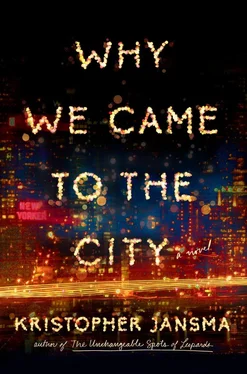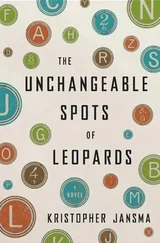“A water main burst on Sullivan!” someone — he thought it was William — was saying. George had opened up the last of his umbrellas — a huge yellow one — and was attempting to climb into it so as to sail home again. Jacob pitched backward and all he could see were the tops of buildings and a starless sky. The last thing he remembered feeling that night was William’s surprisingly strong arm around his shoulder. Jacob was already half dreaming that George was now rowing them downstream in the yellow umbrella. The things he thought and saw were connecting nothing with nothing, and everywhere there was the roar and flash of fire trucks.
• • •
The boy lived in a “not very Jewy” part of Westchester. At least that’s what his mother said when his father wasn’t around, which, thank God, was fairly often. Things had a way of working out like this for the boy. His father sold supplemental life insurance and was generally best avoided. His mother did everything for him, and as far as the boy could tell, his father never did anything for her. She had even become Jewish for him, something she brought up a lot, which was why the boy was Jewish, but his father acted as if this were no skin off her back at all. The boy did as many nice things for her as he could think of, to try to make up for it all. His mother told him how special he was at least once a day and sometimes more often.
Every morning his mother drove him thirty-five minutes up 684 to go to Moses Maimonides, the school his father had picked out for him to attend. He was in the third grade. He asked if he could attend the school right down at the end of their street, and his mother said no; it was just for Catholics. He didn’t know what that was, so she explained that a Catholic is a kind of Christian, which is someone who believes in Jesus, who lived a long time ago and who Christians thought was the Messiah. That last part was in the Torah, which he had at school, about a man who would come to bring all the sinners on earth up to heaven. Anyway, they thought it was Jesus, who’d be back later, but other people, like them, disagreed and thought whoever it was hadn’t come around yet. The boy asked why it mattered if he’d come and gone or not come yet, and his mother said that this was a good question.
When he asked his teacher, though, he got sent to Rabbi Kantrowitz’s office. But Rabbi Kantrowitz agreed it was a very good question, and then took out a big, dusty book called the Talmud and showed the boy where another rabbi from a long time ago named Maimonides, whose name was now on the side of the boy’s school, had written about what the world would be like when the Messiah finally showed up.
“‘And in that time there will be no hunger or war, no jealousy or rivalry. For the good will be plentiful, and all delicacies available as dust. The occupation of the entire world will be only to know G-d… the people Israel will be of great wisdom; they will perceive the esoteric truths and comprehend their Creator’s wisdom as is the capacity of man. As it is written, For the earth shall be filled with the knowledge of God, as the waters cover the sea .’”
This sounded pretty good to the boy. He asked if Rabbi Kantrowitz was the Messiah, and the rabbi said no, the Messiah would be a very, very special person. The boy was about to ask, Could I be the Messiah? when he was shooed off to class.
The more he thought it, the more he was sure it could be him. He was the best in the whole grade at math, reading, and history. He knew every possible statistic about the Chicago Bulls by heart. He had won a prize for the best essay about what the world of 2010 would be like (undersea villages, connected with tunnels). He was patient with all the other boys, despite them being stupid when it came to subtracting large numbers, and sticking their fingers up their nostrils, and forgetting how to spell pepper or what the capital of France was. There were other things too. The boy had once, when no one else was around, levitated a spoon with his mind. He couldn’t do it again later, when his mother was there, although she said she’d definitely seen it vibrating. The boy could sometimes make his favorite songs come on the radio just by thinking about them. Every day the evidence grew more impressive. He began looking forward to the day when he’d fix all of mankind’s problems.
But it was hard to know that he was the Messiah and not be able to tell anyone else. The only boy he thought he might be able to trust with his secret identity was Isaac Schechter, who sat up front in all the classes and nearly always got the answers right, except when it came to long division. The boy had wanted to be friends with Isaac for a while, but his father wouldn’t allow the boy to invite Isaac over after school because he said Isaac was a “sissy.” At school, Isaac had speech therapy during normal lunch hour, so the boy couldn’t sit with him, and he already had Zeke as a lab partner. Finally, during swimming at gym class, his prayers were answered (of course), and the boy and Isaac were paired up. God had made it happen.
For three wonderful weeks, during swim class, he and Isaac covered the same position in water polo games. They changed in the same corner of the locker room. They always compared how pruny their fingers would get in the water. When Isaac got cold, his lips turned a little blue. Isaac didn’t mind sharing his towel if the boys got splashed near the pool. Secretly, the boy splashed his towel on purpose, just so they could share. He didn’t really know why. He just knew that he liked knowing the towel had been on Isaac’s skin just before it was on his.
The final day of swimming came, and the boy gave Isaac a special signal they’d devised, which meant to dive when the teacher wasn’t looking. Underwater, sound traveled better than in the air, and more important, all the people up on the surface couldn’t hear you.
“I HAVE TO TELL YOU A SECRET!” the boy shouted.
Isaac pointed to the top. Both boys went up to the surface and took really deep breaths. Then the boy put his hands onto Isaac’s shoulders, and Isaac put his hands on the boy’s, and they pushed back down under the water. All around them it was blue and still. This was what it would be like in heaven, the boy thought. When God covered the whole world with the sea. Warm water covered him like a blanket. His hair lifted lightly from his scalp. Far away, the other boy’s legs were kicking and swirling up white tornadoes of bubbles. Isaac’s hair was floating like a halo around his head. They were gripping each other’s arms to stop from rising up. Isaac’s dark eyes were searching, and then the boy saw his blue lips open to release a big brilliant bubble. And then they were kissing.
The boy wasn’t sure if he’d started it or if Isaac had, but he never wanted to stop. He felt dizzy, and the water around him began to burn with an intense white light, and he thought he could hear the voice of God from all around him, calling his name—
Then in an instant it was all over. Mrs. Cogen, the gym teacher, had pulled them both to the surface. She was very angry. She marched him straight to Rabbi Kantrowitz’s office before he’d even dried off or changed his clothes. There he sat, damp and shivering, in an old cantor’s robe, until she finished telling the rabbi what had happened.
When Rabbi Kantrowitz took the boy into his office, he asked why the hell he had tried to drown poor Isaac. The boy didn’t realize, and wouldn’t realize until he was older, that neither the rabbi nor Mrs. Cogen knew that they had kissed. The boy explained that he had only been trying to tell Isaac something important. A secret. And the rabbi had demanded to know what it was, so the boy tried to tell him that he wasn’t like the other boys. That he was special. He wanted to cry out, I’m the Messiah! I was sent to unite the tribes of Israel! I am the one who wrestles with the angels. I am the one who will prevail with God. But these things all seemed silly the moment he considered them out loud.
Читать дальше












